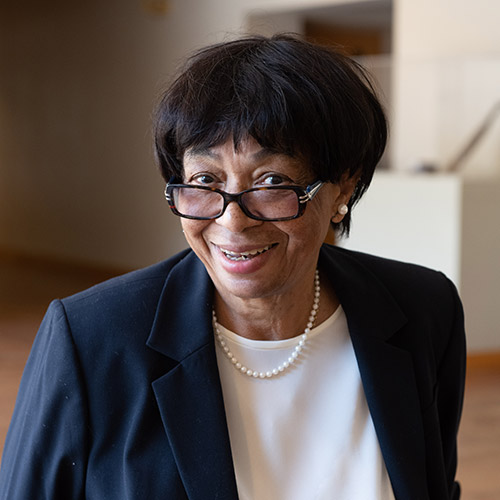
Josephine Wright discovers Civil War press is rich resource for continued slave music research

Josephine Wright, professor emerita, Africana studies and music, may be 80 years old and retired from teaching after 40 years at The College of Wooster, but she still dedicates much of her time to research. Her latest research continues the work she did for an essay in a December 2020 flagship music journal on “U.S. Slave Music through the Lens of the Civil War Press Corps.” She plans to turn the expanded research into a book on the same topic.
Known for her pioneering research and teaching of women’s and African Americans’ participation in musical life, Wright “stumbled upon” a primary source rich with details about the lives and music of enslaved individuals. The treasure trove of information was tucked inside newspaper correspondents’ published articles during the Civil War. The articles she discovered in the Philadelphia, New York, and Boston papers of the era provided the basis for her Journal of the American Musicology Society article.
When she started the slave music research in about 2015, one of the first sources she reread was William Allen’s Slave Songs of the United States, which was published in 1867 and considered the earliest major publication of slave music in the United States. Within the book’s forward, there was a mention of Kane O’Donnel, a correspondent for Forney’s War Press out of Philadelphia. For a year, she tried to get access to O’Donnel’s articles until she learned the University of Pennsylvania was digitizing the newspapers.
O’Donnel, a 25-year-old college graduate, was assigned to follow General Sherman’s March to the Sea in 1865. “Can you imagine this adventure of a lifetime for this young man?” Wright said. “He wrote with unabashed passion about everything, even the Black people.” He was one of the early war correspondents, but not the only one, who was embedded in the field with American soldiers during the Civil War. They became the public’s chief source of information about the war, including the southern slaves. The northern newspapers included information about slaves and freedman, and the smaller papers reprinted the information, often without attribution, which spread the news to more mostly white readers, she said. “These articles helped to shape the public’s perception of slaves and Black culture but often obscured the harsh realities of slavery and the unique culture that slaves forged for themselves under these conditions,” she added.
The journal article was part of a colloquy of like-minded academicians who first gathered at a June 2018 seminar on “Writing Blackness & Gender into American Classical Music” at the University of Michigan in Ann Arbor and then created EMERT, a think tank on the same topic. The unique group of scholars who were at various stages of their careers and from across the country became focused on publishing their research. Within six months their writings were accepted for publication, quite a feat in the world of academic publishing, Wright pointed out. She earned an invitation to the seminar and think tank because of her expertise and academic excellence in music and Africana studies as well as for her discovery of the war press primary source. “I’d never been a part of a think tank before. It was a wonderful and inspiring experience. I was able to tell the academic community that this (the war press) was uncharted territory for investigation of African American history and culture,” she said.
“My optic as a historian is to provide a documented narrative of the transition of Black people and their culture during the Civil War up until the passage of the 13th and 14th amendment in 1865. It’s an important period that the historians don’t cover very well. They cover the battles, but what they forget, these papers are rich in genealogy, in battle history but also rich in terms of people,” Wright explained.
To provide a glimpse of the kind of information gathered from the correspondents’ articles, Wright referenced an article in The New York Times about “an unusual wedding” of Mr. and Mrs. Thomas Levine. The Levines were servants of the officers in charge at a big Army garrison in the Sea Islands that the government controlled. The article identified everyone who was at the evening soiree and provided detailed descriptions of the “contortions” or dancing at the elegant event. “For The Times to give so much press tells us a lot. We are being told from a first-hand observation about the lives of southern slaves or freedmen in their transitional period,” she said.
Digitization of historic newspapers has breathed new life into Wright’s research. Daily she is driven to read through the plethora of articles in the publications and follow her passion for lifelong learning. In addition to the New York, Philadelphia, and Boston papers, she has studied papers from Wisconsin, Illinois, and Ohio and continued to collect information and insights for her book project. ”I’m really into reading these newspapers. Things are really starting to fall into place,” she said.
“Dr. Wright’s lead article in the Journal of American Musicology Society colloquy is a career-crowning achievement. It is also emblematic of how important her scholarship has been not only in lifting up the history of African American music in America—and the racist characterizations of it in the largely white Civil War era news media—but also in demonstrating how that history continues to shape politics and music in the present day,” said Christa Craven, dean of faculty and professor of anthropology, sociology, and women’s, gender, and sexuality studies.
Posted in News on June 5, 2023.
Related Posts
Related Areas of Study
Music
Earn a bachelor of arts in music or a bachelor of music in either music performance or music composition
Major MinorAfricana Studies
An interdisciplinary approach to interpreting the lives and experiences of the world's Black women and men.
Major Minor

